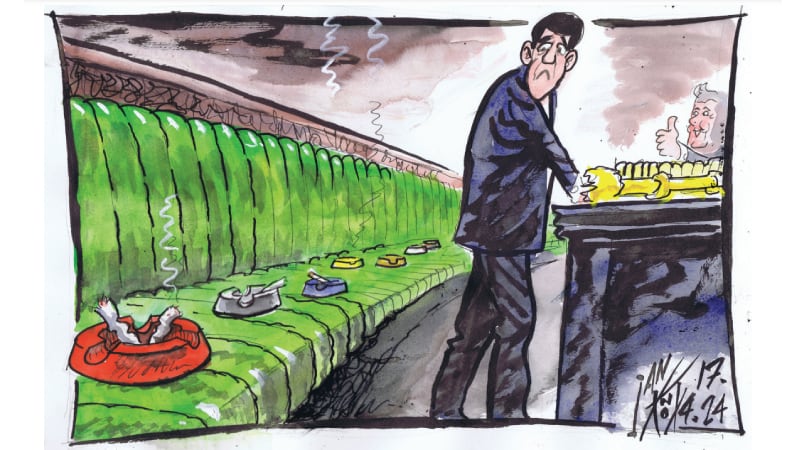Listening to the interviews of the leaders of the north’s political parties recently, one interesting trend seems to be developing with regards to Sinn Féin. An unashamedly republican party, interviewers seem to be keen to denigrate their republican principles and suggest that they are putting much more interest in day-to-day issues. This may well be an attempt to lose them some of their core republican support, or it could be an ignorance of the fact that Sinn Féin has always been acutely interested in grassroots politics and looking after the ordinary person.
Sinn Féin have been to the forefront in seeking the peaceful reunification of this island and behind this is the core belief that this would result in better economic, health and social care for all of its citizens. The British and Irish media have, over the years, failed to acknowledge this in their efforts to minimise support for Sinn Féin. They have consistently focused on their support for the armed resistance in the past in a futile attempt to keep them marginalised. However, Sinn Féin have never left their grassroots off their agenda and have fought for the rights of the ordinary people irrespective of their political beliefs.
The British media have always been aware that this was the strength behind Sinn Féin and therefore gave it little attention or media coverage. This policy is sadly lacking in all of the unionist parties, they have lost contact with their grassroots and so young Protestants have had no-one to tend their needs in education and day-to-day affairs. This has resulted in a gap between young Catholics and Protestants in educational success, with the former surging ahead. However, the constitutional political parties of unionism need to wake up to this very concerning situation and realise that words are not enough, urgent action is needed and needed now.
To Sinn Féin it matters not which community you belong to, their policies are aimed at everyone irrespective of your political beliefs.
It is these values that have placed Sinn Féin at the top of the political ladders in both the south and the north of this divided island. It is these same values that will eventually play a major role in the reunification of this island and lead to a more fair and prosperous future for all its people. Sinn Féin knows that there is still much work to do, many doubts to be addressed, but feel they are in the final stages of a 100-year-long journey.
SEAN SEELEY
Craigavon, Co Armagh
DUP will no longer be largest party
It would appear from the polls by Lucid and the University of Liverpool that Sinn Féin will top the poll with around 27 per cent and have a six-point lead over the DUP. While polls always have their weaknesses, margins of error, weighting factors particularly based on turnout etc, this is probably a fairly accurate reflection of public opinion reinforced by Lucid’s record on previous elections.
However, this does not mean that Sinn Féin will actually win additional seats. In fact, I believe they could lose seats. An analysis of the candidates the party has nominated for the election would indicate that it was more interested in consolidating the 27 existing seats rather than trying to gain additional ones.
They have nominated 34 candidates, at least one for each constituency but four of whom would appear to be paper candidates only, ‘no hopers’, meaning that there are only three potential gains. These would require a collapse of the SDLP vote which is not likely according to the polls.
The polls also suggest that the Sinn Féin vote is lower than that 27.9 per cent gained in 2017 and this could make some of the existing seats vulnerable particularly in the four constituencies where the party holds three out of the five seats.
The more interesting finding is the significant increase in support for Alliance and the TUV and the loss of support for DUP. Based on these figures, it would be impossible for the DUP to be the largest party even if Sinn Féin lost a few seats. It would therefore lose the opportunity to appoint the First Minister.
The increase in TUV support is somewhat ironic.
The TUV’s main aim is to stop a Sinn Féin First Minister but every vote it wins makes this more likely. Most TUV votes will revert to the DUP when the TUV candidate is eliminated but should he manage to reach the quota and gain the seat this will certainly be at the expense of the DUP which would therefore have less chance of remaining the largest party and retaining the right to nominate the First Minister. Voting TUV is in fact facilitating a Sinn Féin First Minister.
My analysis based on the polls and the individual constituencies shows that the DUP will no longer be the largest party.
BRIAN WILSON
Bangor, Co Down
Dysfunctional political system
Voters in the north are sincere when they list their priorities as health, education, the cost of living and the climate emergency. The candidates are in the main equally sincere when they say they want to address these issues. The reality however is that the political system and the economy in the north continue to be dysfunctional because the polity itself is dysfunctional having been created a century ago to accommodate a reactionary, anti-democratic ideology which made religious bigotry its central organising principle. The cycle of stasis followed by recourse to Dublin, London, Brussels and Washington for solutions is now an inbuilt feature of the political structures.
It is also a recognition that lasting stability cannot be achieved within the constraints of partition. It may well be that the cycle can be repeated after the elections to find another short-term fix for Stormont.
However, a truly transformational change will only be achieved by moving beyond the parameters of partition.
A citizens’ assembly empowering and promoting a broad range of voices is therefore critical to the engagement required as part of the preparation and planning for a new, agreed and reunified Ireland.
PAUL LOUGHLIN
Doire
Out of touch with reality
Once upon a time we closed the leisure centres and tied up the swings on Sundays for fear of offending the Lord. Now we are opening the bookies on a Sunday and it’s all in the name of progress. But is it? In an era when practically every town in Northern Ireland has a charity shop and a food bank – and of course that very necessary bookies shop – perhaps it’s only the rich and the better off who can afford to gamble – surely not the poor, the impoverished and those who survive on state handouts. Tell me I’m out off touch with reality as it exists in our little province.
MICHAEL DRAKE
Downpatrick, Co Down







